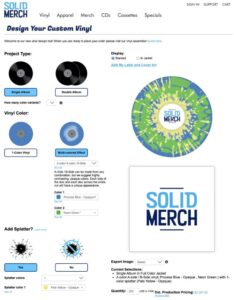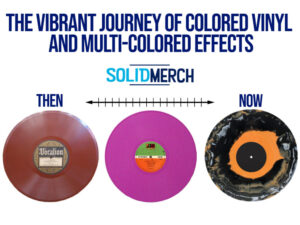
The Vibrant Journey of Colored Vinyl and Multi-Colored Effects
Vinyl records are more than just a way to listen to music—they’re an experience. With their rich sound and tactile charm, they’ve always held a special place in music lovers’ hearts. But vinyl’s magic doesn’t stop at sound; it’s also a visual feast. Colored vinyl and intricate multi-colored effects have turned records into stunning collectibles and vibrant works of art. Let’s spin through the colorful history and creative techniques that make these records so captivating.
Where It All Began
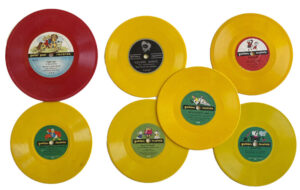
Colored vinyl traces its roots back to the early 20th century. While black vinyl dominated the scene, early experiments with color popped up for special releases or kids’ records. These were often simple solid shades like red, blue, or green—nothing flashy yet.
In the 1940s and 1950s, colored vinyl gained traction as a clever marketing tool. Labels like RCA Victor released their iconic 45 RPM records in various colors to help listeners easily identify genres. It wasn’t just practical—it was eye-catching, and it set the stage for a whole new way to experience vinyl.
The Psychedelic Splash
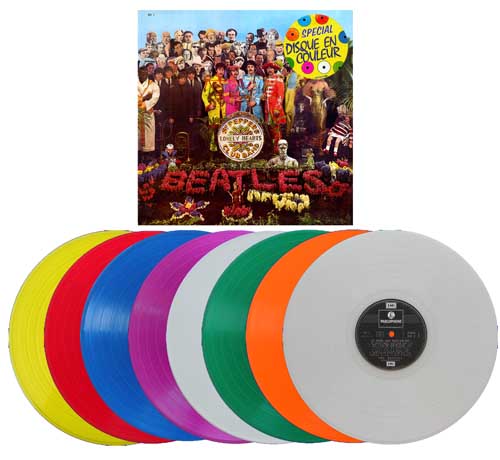
By the 1960s and 1970s, creativity in music was matched only by the explosion of color on vinyl. Psychedelic rock bands, counterculture movements, and bold visual art collided to push the boundaries of design.
Take The Beatles’ Sgt. Pepper’s Lonely Hearts Club Band, for example. Its special bright yellow pressing became an instant icon. Bands like Jefferson Airplane and Pink Floyd embraced it as part of their overall artistic expression. Records weren’t just tools for music—they became extensions of the art itself.
A Treasure Trove for Collectors
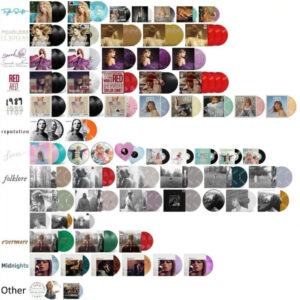
As vinyl cemented itself as a cultural staple, colored pressings became a hot commodity for collectors. By the 1980s and 1990s, limited editions in wild colors and patterns had fans lining up to grab rare finds.
This era also saw the rise of picture discs—vinyl records with full-color graphics embedded in the surface. While technically different from colored vinyl, these discs contributed to the movement of turning records into visual masterpieces.
Modern Marvels: Multi-Colored and Splatter Vinyl
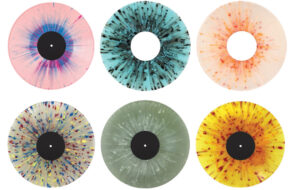
The modern vinyl revival has brought a wave of innovation, especially in how records are crafted. Today’s colored vinyl isn’t just bold—it’s dazzlingly intricate. Techniques like splatter, marbling, and split-color effects have made each record unique.
- Splatter Vinyl: Streams of color radiate from the center, thanks to a method of dripping hues into the pressing mold. No two splatter records are ever the same.
- Marbled Vinyl: Swirls of color blend together to create a dreamy, psychedelic effect reminiscent of the ’60s.
- Split and Quad-Color Vinyl: These records feature distinct sections of color or quadrant patterns, perfect for limited editions.
- Glow-in-the-Dark Vinyl: Phosphorescent materials give these records an ethereal glow, adding a whole new level of visual fun.
A Canvas for Creativity
Colored and multi-colored vinyl has become much more than a gimmick. It’s an art form, blending music and design into a cohesive masterpiece. For musicians and labels, these vibrant discs are a way to enhance the album experience, creating a product fans want to own and display.
Vinyl also bridges the gap between visual and auditory art, allowing for a richer, multi-sensory connection to music. Each colorful pressing tells a story, enhancing the artistry of the album itself.
Looking Ahead
The history of colored vinyl is proof of the enduring magic of physical music. From humble beginnings as a marketing tool to its current status as collectible art, colored vinyl continues to evolve, reflecting the creativity of the music world.
With vinyl’s resurgence, the future promises even more dazzling designs and groundbreaking techniques. Whether you’re an avid collector or new to the vinyl scene, colored records offer an unparalleled way to experience music—both sonically and visually.
These aren’t just records; they’re vibrant pieces of history, culture, and art, spinning timelessly on turntables across the globe.
Solid Merch has made it easier than ever to make the physical representation of your art a piece of art in itself. With our new Vinyl Design Tool (pictured above) you can play with vinyl colors, effects, splatter, and create mockups with your artwork instantly!
